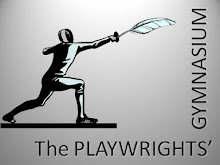The Playwrights Gymnasium, a process-oriented playwrights workshop in Washington, D.C., now in its sixth year, is expanding its offerings and accepting new members for the 2011-12 sessions.
The focus of the gym is the development of craft through monthly mini-workshops. Members receive monthly writing prompts, exercises, or other assignments that address issues such as characterization, writing more effective dialogue, structure, or other means of exploring their scripts. We believe that the insights we gain in the gym strengthen our skills outside of it, but many of these assignments also trigger new work, and some of our members have won national competitions with plays that began in the gym.
In the past, the group has met the first Sunday of the month at Flashpoint, 940 G St. N.W. Because of demand, we are organizing a second session, meeting time to be determined based on the needs of the new members.
For more details about us, our process, and our fee structure, check out our website or send us an e-mail.
Monday, July 18, 2011
Tuesday, August 18, 2009
We are the Playwrights' Gymnasium
"The Playwrights' Gym is different from any other 'writers group' I've ever been a part of, in that it's focused on process rather than product. As such, you're really invited to stretch yourself. I've consistently written things that would never have come from me had it not been for the exercises we tackle in this group."
-- Eric C. Peterson
The Playwrights' Gymnasium was founded in 2004 by Washington DC playwrights D.W. Gregory and Paul Donnelly.
The group meets monthly at Flashpoint (9th & G Streets, NW) to stretch themselves as artists by writing toward specific exercises, such as:
The group meets monthly at Flashpoint (9th & G Streets, NW) to stretch themselves as artists by writing toward specific exercises, such as:
- Take a comic scene you've already written and re-write it as though it were a tragedy. Or, take a dramatic scene you've already written and re-write it as though it were a comedy. What did you have to do, aside from adding or removing jokes from the scene? Did your characters change considerably from one form to another? What else had to change in order to write for a different genre?
- Take a play you've already written, and locate a scene that you feel is "missing something." Then, reflect on what the characters in the scene were doing one minute before the scene started. Then five minutes before. Then an hour before. Then six hours before. Then 24 hours before. Now, write a scene that takes place anywhere from 36 to 18 hours before this scene. What do you now know about the characters and their situation that can inform the original scene?
- Write a series of "emotional states" (i.e., elated, exhausted, fearful, angry, bored) on a deck of index cards. Pick three cards at random and pass them to the person on your right. Now, take the three cards from the person on your left and write a three-person scene featuring the personifications of these three emotional states. How did writing while leading with emotion (as opposed to plot or other character attributes) affect your writing? Were the emotional states of your characters static or did they change as the scene progressed?
-- Deen
Subscribe to:
Posts (Atom)
